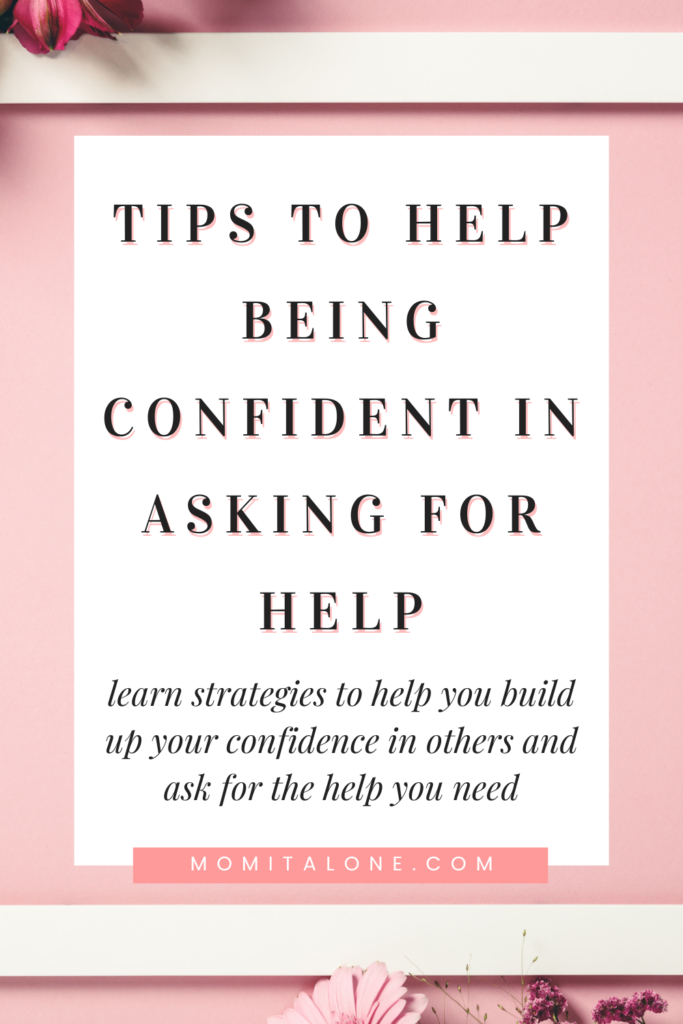Tips To Help Being Confident In Asking for Help
Are you a pretty independent person? Do you have a difficult time asking for help? If you answered yes, you are in good company.
But, if you’re pregnant, you’re going to need help from time to time while you are in that 40-week stretch and after. (And for the next 18 years or so, but let’s start with pregnancy and postpartum recovery).
Growing up, when I would reach out for help on something, oftentimes I would be told to figure it out or ask someone else for help.
Which, for the most part, forced me to figure things out on my own, resulting in me becoming more independent, but it also deterred me from asking others for help.
There were also times when I would ask for help and that help would fall through or fall short only reinforcing this behavior of avoidance and further independence.
Now, I’m not saying that every time I asked for help it wasn’t received, but when you get in this habit, you tend to veer away from reaching out to others unless it’s absolutely necessary.
Your mindset sort of defaults to a consistent state of “I can do it all by myself”. And even though I’ve gotten better at reaching out for help when needed, this is typically still where my head goes first.
I don’t see this as a flaw or weakness. I think people should try and solve their problems on their own first.
It helps to build up your self-esteem and be more self-reliant, but if you know you should or need to ask for help and are just being stubborn, that’s where this pattern can get you into trouble.
Being independent like this makes you a pretty strong and resilient type of person. But with pretty much everything there are pros and cons.
I don’t think I’d have my son today if I wasn’t such an independent type of person. I knew that I would and could be a mom on my own.
With that being said, there were (and still are) times when I needed to ask for help and other times that I really should have asked instead of trying to accomplish certain things all by myself.

This post may contain affiliate links. That means if you click and buy, I may receive a small commission (at zero cost to you). Please see my full disclosure policy for details.
Disclaimer: I am not a medical or psychological professional. The information in this post is for informational purposes from my own experiences and does not constitute medical or psychological advice in any way. I am not liable for any damages resulting from using the information in this article. Please consult a doctor for your medical advice or a professional for psychological guidance.
Learning to Trust
Do you find it challenging to place trust in others? Or maybe you’ve just been able to do things so well on your own that you don’t feel the need to test out that whole trust thing with other people.
Maybe this is just the excuse you use to avoid trying to trust people. Trust is a hard thing to build, especially when you are a skeptical person like myself.
It’s not easy to place your faith in another person. Trusting people to come through for me is not my forte. (I’m working on it).
Instead of trying, I would just avoid asking. Can’t be let down if you don’t ask, right?
Wrong. When you do that, you could be letting yourself down or even those who depend on you.
Now, I’m not saying to just go out there and trust everyone or that you can’t do things on your own. I think that having a little help on your side couldn’t hurt and maybe you just need to try and find the right people to have in your corner.
Breaking The Habit
Start small. Both with the group of people you reach out to for help and the size of things you need help with.
Try starting with just a few people that you have a solid relationship with and are pretty reliable.
You could start with some smaller tasks. Perhaps some things that you could do on your own, but would be a whole lot easier with a little help from a friend.
The Group Text
For example, if you need to put the crib together it would be a lot easier and faster process to have another set of hands to help, right?
Try sending out a group text to those few people. That way the pressure is off to ask someone one-on-one, and if one person can’t help, perhaps one of the others will be able to.
It can also be discouraging to reach out to one person, have them turn you down, and then have to turn around and do it again. It’s hard enough asking once for people like us, which is why the group text is the go-to move.
This will help you to build trust with those people and get you feeling more comfortable with reaching out. (And if no one responds, cast a wider net or find a different group. You need people who will show up for you).
The Signup Sheet
Maybe you are nervous about the first few weeks at home with your new baby all on your own. Postpartum is real and your hormones are going to be going haywire trying to regulate after birth.
There’s so much that needs to be done. You have to care for your fur children (if you have them), somehow get some laundry done, the dishes aren’t going to do themselves, you haven’t showered in several days, and all the while you’re trying to keep a tiny human being alive and happy.
You may be supermom, but even superheroes need sidekicks. Someone to lend a helping hand.
You probably don’t want to put all that on one person and asking several people feels overwhelming. There’s an alternative to being so direct.
Try building out what you need in a platform like Give InKind and sharing the link to the signup with a group of people. Ones that you feel comfortable being around.
You will have just had a baby and may not be feeling in the mood to host or look even half your best (and no one expects you to, you just gave life to another human), but it doesn’t mean you have to open your home to everyone.
People will be excited to meet the new baby, but maybe just keep visitors to this group for the first couple of weeks. The signup sheet also helps you to regulate how many people can be around at once.
If you don’t want multiple people around at one time, you don’t have to. The sheet also allows people to sign up for tasks they want to volunteer for when it’s convenient for their schedule.
It takes the pressure off having to directly ask for help and allows people who want to help to volunteer their time.
Pick A Leader
Put someone in charge of coordinating or communicating for you. This should be someone you are very comfortable with.
You may need or want to be more direct in your communications. You’ll be lacking sleep and on a pretty rigorous schedule.
You’ll want to be comfortable enough to communicate in this manner to that person and know that they won’t take offense and deliver it in a better way than you’re currently able to.
Let them know what you need, if there are gaps in the times between signups, or if there are specific things you want help with. Have them share those things with your group.
Having that person in charge takes the pressure off you to communicate with several people about what would help to make your life easier in your current vulnerable state. You only have to reach out to one.
Your Village
We’ve all heard the phrase “it takes a village” when referring to raising a child. Turns out it’s a classic for a reason.
You’re going to need a babysitter at some point, someone to pick your kid up from practice when you have to work late, someone to vent to because being a mom is hard work.
Your village will most likely start with that small group of people whom you began your habit-breaking-reach-out exercise with. You’ll hopefully have built a stronger bond with them and feel comfortable asking these people for help.
You may have also expanded this network of reliable friends. Hopefully, they will also be nearby.
It’s nice to have your village in close proximity to your “village”. Making it more convenient for you and them.
Don’t forget to reciprocate. Don’t let it be a one-sided relationship where you’re constantly taking and not giving back.
Pay-it-forward. It is called a “village” after all, another term for community, where everyone should contribute.
Cheers, Warriors!
I hope you enjoyed reading this post and found it entertaining, educational, inspiring—hopefully, all three. Please be sure to leave any comments or questions you have in the Comments section below.
Don’t forget to sign up for my email list and claim your FREE template for Organizing Your Fertility Information that includes documents to track your appointment notes, fertility notes, financial planner, journal page, and more!

